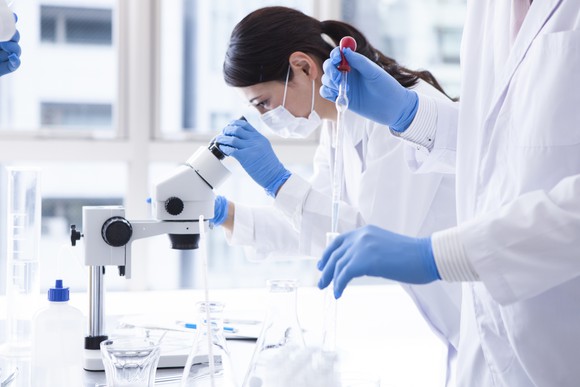It's been an up-and-down kind of year for Bristol-Myers Squibb (NYSE:BMY). Early in 2017, investors were concerned after the company opted not to pursue accelerated approval for a combination of Opdivo and Yervoy in first-line non-small cell lung cancer (NSCLC). Those worries largely evaporated, though, and BMS stock eventually went on to generate nice year-to-date gains.
Now, however, worries are resurfacing. Bristol-Myers Squibb announced its third-quarter results before the market opened on Thursday, with an immediate drop in its share price. Here are the highlights of those results -- and whether investors really need to be concerned this time around.

IMAGE SOURCE: GETTY IMAGES.
By the numbers
First of all, Bristol-Myers Squibb's third-quarter results weren't all bad. The drugmaker reported revenue of $5.3 billion. Not only was that a respectable increase of 7% compared to the prior-year period, but it beat the consensus analysts' estimate of $5.2 billion.
The bottom-line numbers weren't as positive. BMS announced third-quarter GAAP earnings of $845 million, or $0.51 per share, down 29% year over year. Non-GAAP earnings of $1.2 billion, or $0.75 per share, looked a little better. However, the third-quarter result still reflected a 3% decline from the prior-year period and missed the average Wall Street estimate of $0.77 per share.
Bristol-Myers Squibb's updated full-year 2017 outlook was also something of a mixed bag. The company lowered its 2017 GAAP earnings per share (EPS) guidance from between $2.66 and $2.76 to between $2.36 and $2.46. On the other hand, BMS upped its full-year non-GAAP EPS from between $2.90 and $3.00 to between $2.95 and $3.05.
One area where BMS saw clear improvement was in its cash position. The drugmaker reported cash, cash equivalents, and marketable securities totaling $9.65 billion at the end of the third quarter. That's up from $9.09 billion at the end of the second quarter.
Behind the numbers
Let's first address the elephant in the room -- or, rather, in the results. Why did Bristol-Myers Squibb's earnings fall? The GAAP figure dropped mainly because of the company's $310 million acquisition of IFM Therapeutics. This deal is also the primary reason behind why BMS lowered its GAAP earnings outlook for full-year 2017.
However, the IFM acquisition doesn't explain the company's non-GAAP earnings miss. The bottom line (no pun intended) is that BMS simply spent more than it did in the prior-year period. But that spending isn't where you might expect. Marketing, selling, and administrative expenses remained flat at $1.1 billion. Research and development expenses rose, adjusting for the IFM deal but not by a lot. Instead, the main culprit behind lower earnings was a 20% jump in cost of goods sold.
On a positive note, anticoagulant Eliquis and cancer drug Opdivo are flat-out rocking. BMS reported revenue for Eliquis in the third quarter of $1.2 billion -- up 39% year over year. Opdivo's sales came in at $1.3 billion, a 38% increase versus the prior-year period.
Bristol-Myers Squibb's other top brands also performed well. Sales for autoimmune disease drug Orencia grew to $632 million, roughly 12% higher compared to the third quarter of 2016. Cancer drugs Sprycel, Yervoy, and Empliciti all posted solid single-digit percentage year-over-year sales growth. Although revenue for the company's older anti-viral drugs continued to fall, BMS' other products more than offset those declines.
No worries?
I wouldn't say that Bristol-Myers Squibb is a worry-free stock. There are too many uncertainties for its pipeline candidates and competition from others in the market. However, I don't see anything in the company's third-quarter results that should cause investors to fret.
Despite a few bumps in the road over the last year or so for Opdivo, it's still a huge blockbuster and has a bright future ahead of it. EvaluatePharma thinks the drug will rank as the second-highest-selling cancer drug in the world by 2022 with annual revenue of $9.9 billion. I think that's a realistic assessment. The momentum for Eliquis also continues to be impressive.
My chief concern with Bristol-Myers Squibb is that its pipeline is skewed toward early- and mid-stage assets. But with Opdivo and Eliquis performing well, that's not something to lose sleep over. I won't say that BMS is the best pharma stock on the market. It isn't. However, the company has solid prospects over the long run. An earnings miss in the third quarter doesn't change those prospects at all.
10 stocks we like better than Bristol-Myers Squibb
When investing geniuses David and Tom Gardner have a stock tip, it can pay to listen. After all, the newsletter they have run for over a decade, Motley Fool Stock Advisor, has tripled the market.*
David and Tom just revealed what they believe are the ten best stocks for investors to buy right now… and Bristol-Myers Squibb wasn't one of them! That's right -- they think these 10 stocks are even better buys.














